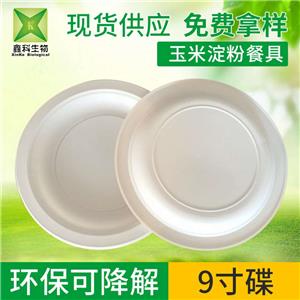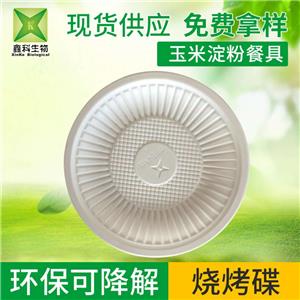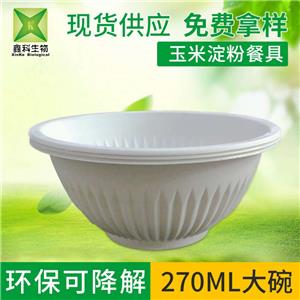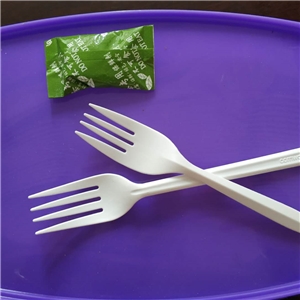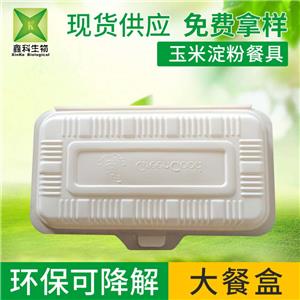-
2018-09-12150碟子
-
2018-09-13一次性環(huán)保餐具-碟子
-
2018-09-14一次性可降解餐具-270ml碗
-
2018-09-14一次性餐具-叉子
-
2018-09-14環(huán)保餐盒
可降解顆粒的環(huán)保材料特點
可降解顆粒是一種新型的環(huán)保材料,通常由可降解的聚合物制成。它們具有以下特點:
Degradable particles are a new type of environmentally friendly material, usually made of degradable polymers. They have the following characteristics:
可降解性:可降解顆粒在特定的環(huán)境條件下,可以分解成無害的物質,減少對環(huán)境造成的污染。常用的可降解聚合物包括聚乳酸(PLA)、聚羥基脂肪酸酯(PHA)等。
Degradability: Under specific environmental conditions, degradable particles can decompose into harmless substances, reducing pollution to the environment. Commonly used biodegradable polymers include polylactic acid (PLA), polyhydroxyfatty acid esters (PHA), etc.
生物相容性:可降解顆粒通常對生物體具有較好的生物相容性,不會對人體或其他生物產生明顯的毒性或過敏反應。
Biocompatibility: Biodegradable particles typically have good biocompatibility with organisms and do not exhibit significant toxicity or allergic reactions to humans or other organisms.
應用廣泛:可降解顆粒可以用于各種領域,例如包裝材料、農業(yè)用品、醫(yī)療器械、食品包裝等。它們可以完全替代傳統(tǒng)的塑料制品,減少對非可再生資源的依賴。
Widely used: Biodegradable particles can be used in various fields, such as packaging materials, agricultural supplies, medical devices, food packaging, etc. They can completely replace traditional plastic products and reduce dependence on non renewable resources.
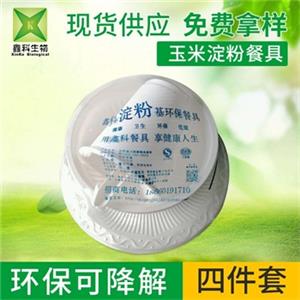

分解速度可控:可降解顆粒的分解速度可以通過調整材料的結構、添加催化劑或控制環(huán)境條件來實現(xiàn)。這使得可降解顆粒的使用更加靈活,可以根據(jù)具體需求進行調整。
Controllable decomposition rate: The decomposition rate of degradable particles can be achieved by adjusting the material structure, adding catalysts, or controlling environmental conditions. This makes the use of degradable particles more flexible and can be adjusted according to specific needs.
工藝成熟度較高:可降解顆粒的生產工藝相對成熟,技術比較成熟,可以大規(guī)模生產。
High process maturity: The production process of degradable particles is relatively mature, and the technology is relatively mature, which can be produced on a large scale.
需要注意的是,盡管可降解顆粒具有許多優(yōu)點,但其性能和應用仍然存在一些限制。例如,可降解顆粒的物理性能(如強度、耐熱性等)可能不如傳統(tǒng)塑料,還需要進一步改進和研發(fā)。此外,可降解顆粒的分解速度和方式也受到環(huán)境條件的影響,需要合理的處置措施才能發(fā)揮其優(yōu)勢。
It should be noted that although degradable particles have many advantages, their performance and application still have some limitations. For example, the physical properties of degradable particles (such as strength, heat resistance, etc.) may not be as good as traditional plastics, and further improvement and development are needed. In addition, the decomposition rate and mode of degradable particles are also affected by environmental conditions, and reasonable disposal measures are needed to fully utilize their advantages.
- 上一個: 一次性環(huán)保餐具是如何進行查看?
- 下一個: 真假玉米淀粉餐具分辨技巧介紹





